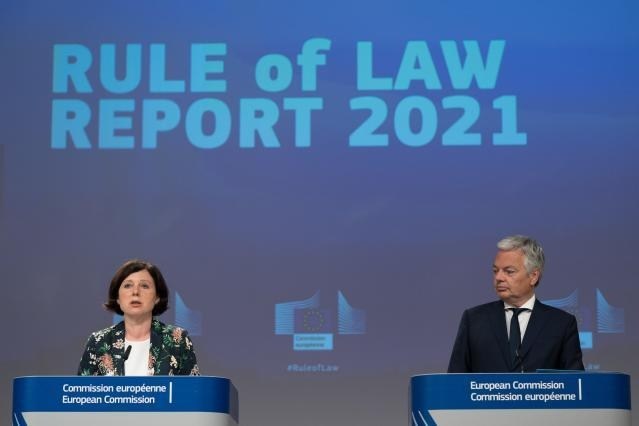The European Commission published today the second EU-wide Report on the Rule of Law showing positive developments in some member states and serious concerns in other countries.
The first report was published in September 2020. The aim of the report was to enlarge the existing EU toolbox with a new preventive tool and to kick-start an inclusive and open debate on the rule of law culture across the EU. It should help all member states examine how challenges can be addressed and learn from best practice in other countries.
The rule of law report includes a Communication looking at the situation in the EU as a whole and dedicated country chapters on each member state. A senior official described the drafting of the report as a complex and politically sensitive exercise but claimed that the member states are increasing at ease with it.
The rule of law includes principles such as legality, implying a transparent, accountable, democratic and pluralistic process for enacting laws; legal certainty; prohibiting the arbitrary exercise of executive power; effective judicial protection by independent and impartial courts, effective judicial review including respect for fundamental rights; separation of powers; and equality before the law.
As last year, the report is structured around four main pillars with a strong bearing on the rule of law: national justice systems, anti-corruption frameworks, media pluralism and freedom, and other institutional issues related to the checks and balances essential to an effective system of democratic governance.
The 2021 report looks at the new developments during the 10 month-period since last September, deepening the assessment of issues identified in the previous report and taking into account the impact of the COVID-19 pandemic. According to the Commission, the report has had a clear impact on the member states by identifying problems and putting concerns and issues on the table for discussion in all countries.
That said, the Commission also underlined also that no single instrument can solve all rule of law issues in the countries. The Brussels Times asked if it might be necessary to design a new tool which enables the Commission to initiate investigations of rule of law breaches if the national authorities fail to do it.
Summarising the report, the second report “shows overall many positive developments in member states, including where challenges identified in the 2020 report are being addressed”. However, concerns remain and in certain member states these have increased, for instance when it comes to the independence of the judiciary and the situation in the media.
“The Rule of Law Report is a useful preventive tool that has stimulated needed debate among the member states and other actors,” said Věra Jourová, Vice-President for Values and Transparency, at the press conference today (20 July). “The second edition shows that member states can make progress to address rule of law matters.”
While the report is not about “naming and shaming” individual EU member states, it lists the countries where rule of law problems exist, mainly in the new member states that joined the EU in 2004 and 2007.
As regards justice systems, among the general public in Austria, Finland, Germany, the Netherlands, and Luxembourg the level of perceived judicial independence remains very high (above 75%), while in Croatia, Poland and Slovakia, the level of perceived judicial independence remains very low (below 30%), according to surveys.
The important role of the Councils for the Judiciary in safeguarding judicial independence is increasingly recognised but serious structural concerns exist in a few member states and have deepened (Poland, Hungary), while challenges of a lesser nature in other member states require attention (Bulgaria, Slovenia).
Tensions around judicial independence are also seen in stalemates, delays and public debates in connection with appointments to high posts in the judiciary in Croatia, Slovenia, Spain, and Lithuania.
As regards Anti-corruption frameworks, the picture is extremely mixed with ten member states in the world's top twenty of countries perceived as least corrupt. Several member states are also currently adopting or revising national anti-corruption strategies or action plans.
Challenges however remain, in particular linked to criminal investigations, prosecutions and the application of sanctions for corruption in some Member States. Major or highly complex corruption cases continued to emerge in various member states. The resources allocated to anti-corruption are not always adequate in some countries.
Overall, the COVID-19 pandemic has slowed down reforms and the decisions in corruption cases in some countries.
As regards media freedom and pluralism, concerns remain with regard to the functional independence and effectiveness of some media regulators (Romania, Spain, Slovenia, Croatia, Malta, Slovakia, Hungary. Vulnerabilities and risks also increase when the political independence of media is under threat, in the absence of regulation against political interference or when rules allow political actors to own media: (Czechia, Malta, Slovenia, Poland, Bulgaria, Hungary).
As regards Institutional checks and balances, the situation seems overall to have improved since last year and some member states have continued to embark on constitutional reforms to strengthen checks and safeguards, among others as lessons learned from imposing emergency measures during the coronavirus crisis.
The report highlights the key role of the Ombudsperson and the National Human Rights Institutions in providing checks and balances, defending the right to good administration and fair treatment, and pointing to violations of fundamental rights. The supreme audit institutions play a similarly if not more important role in the system of checks and balances but are not mentioned in the report.
M. Apelblat
The Brussels Times

